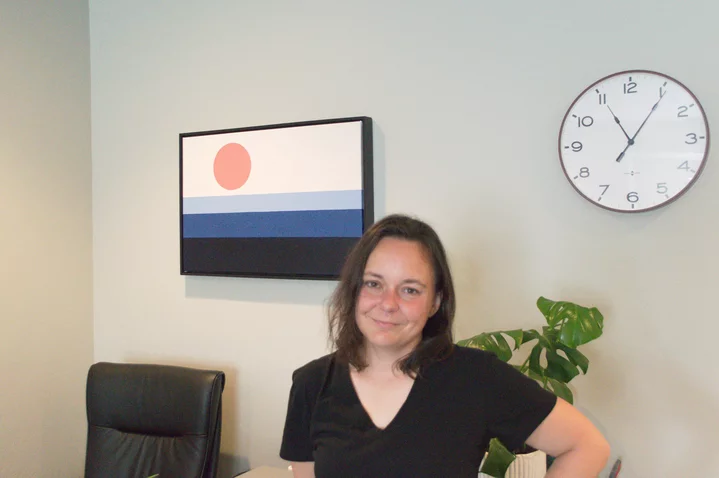Kate Frachon next to her desk.
There are millions of remote workers in the U.S., and many of them get their fix for human connection by camping at coffee shops. It’s a situation that baristas and owners don’t necessarily enjoy, nor can people always stay there long enough to finish whatever they’re grinding away at. Alternative places specifically designed for workers to use are common amenities in big cities; now, there’s one in Arcata too.
Kate Frachon opened Darn Good Work back in March, and the space opened again this month after a break. It’s a cozy space with a cloistered view of some of downtown Arcata’s rooftops and tea and coffee, but that’s not what people really like to go there for.
“I had a project that I had been previously committing three days a week to, and on my first day here with people here, I got everything that I would have done in three days done in one day,” Frachon said in an interview with the Outpost. “There’s almost that social pressure of having people around. You don’t get up and just, sort of, wander around….I see everybody else working, and I’m like, ‘OK, well, I could also work.’ It’s motivating.”
Frachon’s been a remote freelance worker since 2011, mostly for the easy flexibility and variety in her schedule. She moved to Humboldt from Seattle in 2013, where she had used co-working spaces before. She assumed there’d be one here; there wasn’t, and she spent about a decade floating around various cafes getting work done (mainly the Beachcomber and Northtown cafes, though if Cafe Brio had Wi-Fi she would’ve been there more).
Then came the pandemic.
Frachon was stuck at home with a baby and a two-year-old, trying to get stuff done and failing. She was distracted and alone and it was impossible to be productive. She was an introvert, and before she went remote, had never enjoyed working in-person at an office. A supervisor once told her during a performance review that she had to greet people when they walked past her, a task she found draining and pointless; so she was surprised when the pandemic ended and she found she wanted to be near other people when she was working. The idea energized her.
“After the pandemic I became, like, an extrovert,” Frachon said. “I was like, ‘I gotta be with the people,’ even if I’m [not] interacting with them…I’m a person who likes to be alone. I crave ‘alone time,’ but I got way too much.”
In 2024, Frachon set up around six “pop-up coworking events” around Arcata. She rented a few different businesses and said it was a chance to meet and work alongside some other people. They all sold out. Hungry professionals were eager to have some face-to-face time with their compatriots and said they wanted more. She decided it was a good enough proof of concept and decided to rent an office.
Her clientele is fairly diverse, mostly 30- and 40-year-old graduate students working at MBAs or counseling degrees, or workers in a variety of different jobs. Many of them are in tech or are freelancers or consultants. Many remote workers work away from offices because they don’t really want to be around people, but there is a sizable subset who aren’t that way. Many just need a place to get out of the house, especially if they have children.
The space is small, but a nice place to get things done. Frachon said many of her regulars book it because they get distracted at home, or because having a few pairs of eyes on them makes them work harder.
“I’m kind of an anti-productivity, anti-focused person,” Frachon said. “We’re human beings. We’re not robots. But maybe I err too far on that side…I get up from my desk and wander around a lot. Or I just sort of stare off into space a lot. But having other people in here, and looking over and seeing [someone] typing away and getting stuff set up; I could do that too!”
Despite the success of her pop-up events, business has been rocky. There’s been little overlap between the attendees of her previous events who said they wanted a permanent co-working space and the people who have actually been booking the office, and so far no one has been willing to pony up the money for a monthly membership, but Frachon isn’t ride-or-die about its success.
“I don’t put all my eggs in one basket,” Frachon said. “It’ll always be a side thing to my main career, but I’m open to it becoming a bigger thing. I’m also open to it failing. It’s been an experiment, and if the market doesn’t support it, then that’s OK…Remote work is wonderful and terrible. There are good things about it and bad things, and I hope that this space will be a place to get more of the good and less of the bad.”

CLICK TO MANAGE